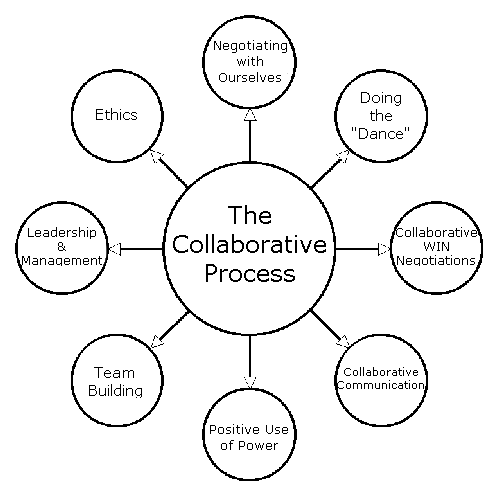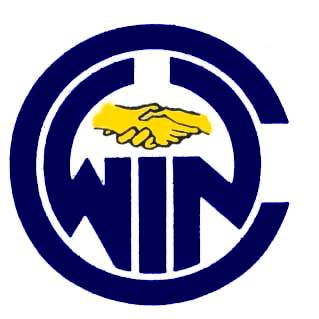











|
WIN’s
Philosophy on Collaboration and Negotiation
WIN’s Collaboration and Negotiation
Philosophy recognizes that most of us fail to think about how we go
about dealing with conflict in our lives. We are
"trained" by society and that training becomes
part of our learned behavior, tucked away in our
subconscious but alive and well as we face different
conflicts in our lives.
We also forget that our most important negotiation is
the daily continual negotiation we do with ourselves as
we make decisions as to what we will do or not do, what
is good, bad or indifferent, how we are with others, and
how we will interact with others. These negotiations with
ourselves take place in both the subconscious and the
conscious level and affect all that we do and all we are
in this world. How we go about this process is usually
not carefully considered, if at all. The WIN training
experience results in the participants knowing themselves
better and becoming equipped with knowledge, skills and tools to
go about that process in a manner which is best for them.
The WIN training starts with three basic premises:
- Conflict is inevitable and unavoidable. We are
confronted daily with conflicts which need to be
resolved, forcing us to negotiate with ourselves
as we make decisions. Beyond ourselves, there is
conflict with each person we come in contact with
because we are each distinct and different from
all others. Those differences guarantee there
will always be conflicts between any two
individuals.
- Conflict can be managed in a positive and
effective manner to turn all of our inevitable
conflicts into opportunities for growth and
improvement. If conflict is not managed, it
escalates and easily becomes a disaster all by
itself.
- Our individual conflict behavior varies with each
incident, the level of the conflict and the
context of the conflict. In fact, however, we can
choose one consistent conflict behavior style, collaboration,
as we negotiate with ourselves, with other
individuals, within groups or teams and one group
against another and in all contexts. One can be
consistently collaborative without being weak or non-assertive; can produce a high level of
satisfaction for all concerned with the conflict,
including ourselves, while improving our
relationships with others.
Our society, on the other hand, has very effectively
"trained" us to be competitive in order to
always "win". While this may be appropriate in
sports, between business competitors, and between persons
running for political office, it is destructive of our
relationships with others and usually leads to escalation
of the conflict, sometimes to the point of the conflict
taking on a life of its own as it spins into greater and
greater loss of control.
WIN’s Collaborative WIN Process (See Diagram on bottom of
page) is the basis for all topics covered. It starts with a
respect for others and their values, beliefs and
interests as well as a firm understanding of one’s
own underlying interests, the driving, motivating factors
relating to the conflict which must be satisfied to an
acceptable level in order to resolve the conflict, rather
than merely settle it.
The relationship is paramount and needs to be worked
on initially and throughout every negotiating process:
building rapport, creating a true dialogue and exchange
of information, gaining understanding of the other
person, educating others about who we are, building the
level of trust. Without trust, there is no relationship.
Without a good relationship, you almost always have
escalation of the conflict. Emphasis is placed upon
understanding others, not necessarily agreeing with them,
but accepting them for who they are.
What differentiates WIN’s Collaborative WIN Process
is that the Collaborative person also gains an
understanding of the interests and values of the other
person, accepts them and is respectful of them, and
attempts to satisfy them to an acceptable level for the
other person while not losing sight of the importance
of their own interests and achieving an acceptable level
of satisfaction of their own interests.
The differentiation between interests and issues is
difficult for most, but it is one of the key ingredients
of WIN’s Collaboration and Negotiation training.
Interests, like values, are a reflection of who people
are and are not negotiable. While there are always
conflicting interests between parties, there are also
common interests which all can work for, simultaneously
satisfying themselves and the other party, and divergent
interests which can be integrated with each other. Issues
are the real, tangible, measurable things we can and do
negotiate. WIN’s Collaborative WIN Process recognizes
that issues are merely means to satisfy differing
interests and that the more issues on the table, the
better one is able to come up with a package which is
acceptable to all. Being able to differentiate between
interests and issues allows one to know what is
negotiable and what is not negotiable.
While it may appear that WIN’s Collaborative
approach takes longer than the traditional method, in
fact, the Collaborative approach takes less time when you
consider the reality of how long a competitive approach
takes to reach a settlement. When one negotiates
collaboratively with others, the next negotiation we have
with them, or the negotiation which may arise to resolve
unforeseen problems of the agreement reached, builds upon
the positive feelings of the previous collaborative
approach to reach a quicker and more amicable resolution.
Empowerment of one’s self and others is a key
part of WIN’s Collaborative WIN Process, giving a sense
of ownership to each person in the negotiation. Power is
important, but learning how to use power in a positive
manner is more important than any power we have. This is
the only way to build relationships, especially when the
level of power is different.
Setting and maintaining a positive tone and frame in
all we say can be one of the fastest ways to improve
relationships and move toward agreement on a resolution.
It also has a substantial influence on all associated
with the conflict, leading people to work on reaching a
fair and equitable resolution.
WIN’s Ideal Collaborative Model gives the
participants a road map to follow in all negotiations.
The Training recognizes that most people with whom we
negotiate will want to use the traditional positional
negotiation style, the "Dance", and that one
needs to allow others to use this style to reach an
agreement. The WIN training gives you an understanding of
the mechanics of this process, teaches you how to plan
for the "dance" and how to predict the outcome,
and gives you with WIN’s Ideal Collaborative Model a
road map to follow to make the process amicable and
efficient. Participants learn that they can
"dance" with them, teaching them some new steps
to make the outcome better for themselves and for the
other party.
The most important aspect of the WIN training is that
it helps people to understand themselves and their values
as they relate to how they address conflict in their
lives. It gives a substantial knowledge base upon which
the participants are able to build their own plan for
their future which is based upon their values and
attitude toward conflict. Most end up seeing each
conflict they encounter as a positive opportunity for
growth and opportunity. Each participant is empowered
with the three different Planning Grids to help them to
properly prepare for their negotiations and
collaborations they will be facing.
Finally, the WIN Training expands the Collaborative WIN Process into Collaborative Communication skills to create
a true dialog with others, Collaborative Teamwork to give
ownership and a sense of equity into team decisions and
efforts, Collaborative Teamwork to be able to reach true
consensus, Collaborative Management and Leadership to
produce motivated and loyal staffs, and Collaborative
Ethical considerations to achieve openness, honesty and
trust. It is all encompassing, leading some to say it
is a way of life.


|


